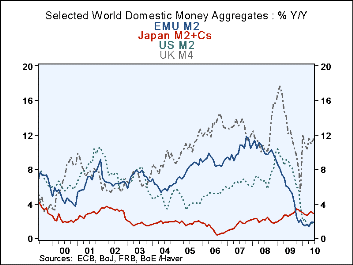 Global| Jul 28 2010
Global| Jul 28 2010Most Money Supplies Speed Up A Bit
Summary
While money supplies have speeded up a bit over three months compared to six months there is no great monetary stimulus in the offing. In the UK there is a set back. Despite all the concerns about the huge excess bank reserves in the [...]
 While money supplies have speeded up a bit over three months compared to six months there is no great monetary stimulus in the offing. In the UK there is a set back.
While money supplies have speeded up a bit over three months compared to six months there is no great monetary stimulus in the offing. In the UK there is a set back.
Despite all the concerns about the huge excess bank reserves in the US. Those reserves are just sitting there being unproductive – worse being counter productive as their very presence haunts the outlook for future inflation, at least for some. US and EMU money supply growth (Yr/Yr) have fallen off sharply over the past year or so but both have started to stabilize and even show some minor acceleration very recently. In the near term UK M4 growth has dropped off sharply. Still the big picture point is that there is little in the way of monetary stimulus in the making- despite some concerns to the contrary.
In the UK M4 growth has been a wild ride, but deflated for prices M4 is now contracting over three months, the only country in the table to do that. Japan’s nominal and real balance growth continues to improve, but that is at a slow pace.
The monetary data are right now not very reassuring for growth. They are not distressing about inflation but given extent of the excess reserves in the US there will continue to be concerns about what will happen when the economy does pick up. Money growth is no impediment to economic growth but neither is it much of a stimulant.
In the Euro-Area credit and loan growth both have picked up a bit and that is a hopeful sign that dove-tails with other brighter recent economic reports.
| Look at Global and Euro Liquidity Trends | |||||||
|---|---|---|---|---|---|---|---|
| Saar-all | Euro Measures (E13): Money & Credit | G-10 Major Markets: Money | Memo | ||||
| €-Supply M2 | Credit:Resid | Loans | $US M2 | £UK M4 | ¥Jpn M2+Cds | OIL:WTI | |
| 3-MO | 3.5% | 4.4% | 4.8% | 4.1% | 0.3% | 4.2% | -25.4% |
| 6-MO | 2.8% | 2.3% | 2.8% | 1.6% | 17.9% | 3.1% | 1.6% |
| 12-MO | 1.9% | 1.2% | 1.1% | 1.8% | 11.5% | 2.9% | 8.2% |
| 2Yr | 3.9% | 2.3% | 1.5% | 5.4% | 11.8% | 2.7% | -24.8% |
| 3Yr | 6.0% | 5.4% | 4.2% | 5.8% | 11.5% | 2.5% | 3.9% |
| Real Balances: deflated by Own CPI. Oil deflated by US CPI | |||||||
| 3-MO | 3.3% | 4.2% | 4.6% | 5.6% | -1.5% | 5.9% | -24.3% |
| 6-MO | 1.7% | 1.2% | 1.8% | 1.9% | 14.0% | 3.3% | 1.9% |
| 12-MO | 0.4% | -0.2% | -0.3% | 0.7% | 8.0% | 3.6% | 7.0% |
| 2Yr | 3.2% | 1.6% | 0.8% | 5.5% | 9.0% | 4.0% | -24.7% |
| 3Yr | 4.2% | 3.7% | 2.5% | 4.2% | 8.3% | 2.7% | 2.3% |
| Japan's Latest CPI is estimated to complete this table | |||||||
Robert Brusca
AuthorMore in Author Profile »Robert A. Brusca is Chief Economist of Fact and Opinion Economics, a consulting firm he founded in Manhattan. He has been an economist on Wall Street for over 25 years. He has visited central banking and large institutional clients in over 30 countries in his career as an economist. Mr. Brusca was a Divisional Research Chief at the Federal Reserve Bank of NY (Chief of the International Financial markets Division), a Fed Watcher at Irving Trust and Chief Economist at Nikko Securities International. He is widely quoted and appears in various media. Mr. Brusca holds an MA and Ph.D. in economics from Michigan State University and a BA in Economics from the University of Michigan. His research pursues his strong interests in non aligned policy economics as well as international economics. FAO Economics’ research targets investors to assist them in making better investment decisions in stocks, bonds and in a variety of international assets. The company does not manage money and has no conflicts in giving economic advice.
More Economy in Brief
 Global| Feb 05 2026
Global| Feb 05 2026Charts of the Week: Balanced Policy, Resilient Data and AI Narratives
by:Andrew Cates






